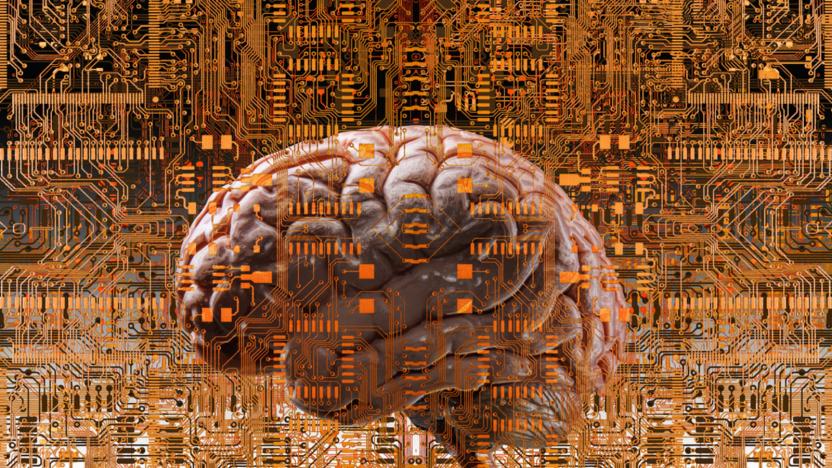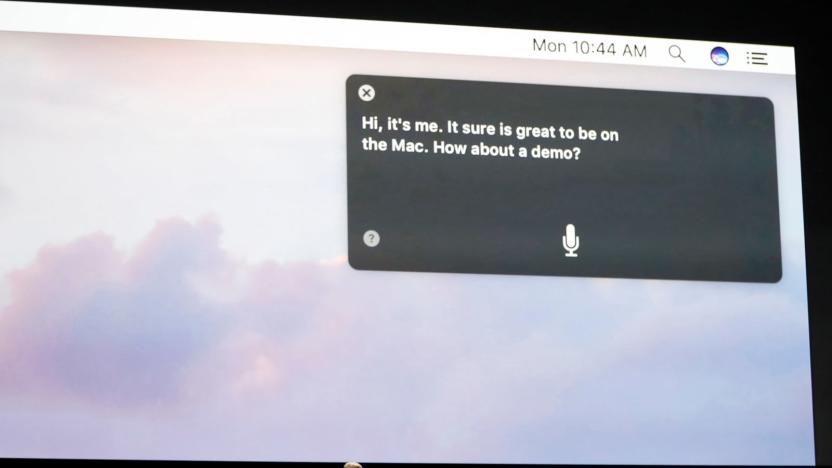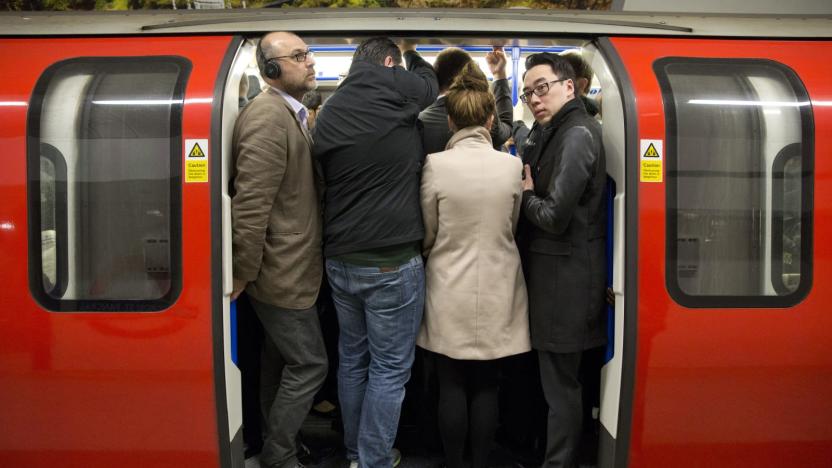MachineLearning
Latest

Google machine learning can protect endangered sea cows
It's one thing to track endangered animals on land, but it's another to follow them when they're in the water. How do you spot individual critters when all you have are large-scale aerial photos? Google might just help. Queensland University researchers have used Google's TensorFlow machine learning to create a detector that automatically spots sea cows in ocean images. Instead of making people spend ages coming through tens of thousands of photos, the team just has to feed photos through an image recognition system that knows to look for the cows' telltale body shapes.

Google's mini radar can identify virtually any object
Google's Project Soli radar technology is useful for much more than controlling your smartwatch with gestures. University of St. Andrews scientists have used the Soli developer kit to create RadarCat, a device that identifies many kinds of objects just by getting close enough. Thanks to machine learning, it can not only identify different materials, such as air or steel, but specific items. It'll know if it's touching an apple or an orange, an empty glass versus one full of water, or individual body parts.

'Watch Dogs 2' web app tries to reveal secrets in your selfies
Ubisoft is no stranger to producing poignant on the surface, but ultimately vapid marketing for its hacker-centric Watch Dogs series. And the latest example of that is a selfie analyzer for the upcoming sequel. The pitch is that your self-portraiture reveals a lot of hidden info about you, and uploading a picture to the web app will reveal it. Stuff like your age, what your picture says about you to employers, financial institutions, pharmaceutical companies, political organizations and police databases -- info based on details in your photos. That's in theory, of course. In practice the results don't pan out so well.

Huawei's new Mate 9 wants to be a smarter kind of smartphone
Huawei's slice of the worldwide mobile pie isn't as big as it used to be, but hey, at least it keeps getting better at making big phones. We didn't know it would be the last Nexus phone, but the 6P was a solid send-off. Then came the enormous Mate 8, which was incredibly well built (even if the company's EMUI interface sometimes made me want to jam a fork in my eye). With the new Mate 9, however, Huawei is trying to do things a little differently. Case in point: The phone will eventually launch in the US, a first for the company's flagship phablets. And that stuffed-to-the-gills custom interface? It's been streamlined, thanks to Huawei's new user experience chief. Fortunately, the company's smart moves don't seem to end there.

Google's AI created its own form of encryption
Researchers from the Google Brain deep learning project have already taught AI systems to make trippy works of art, but now they're moving on to something potentially darker: AI-generated, human-independent encryption. According to a new research paper, Googlers Martín Abadi and David G. Andersen have willingly allowed three test subjects -- neural networks named Alice, Bob and Eve -- to pass each other notes using an encryption method they created themselves.

Google's arty filters one-up Prisma by mixing various styles
Basic filters are soooo last year, and Google knows it. It's all about turning your mundane pet photos into works of art now, spearheaded by popular mobile app Prisma. Since it launched earlier this year, Prisma's added an offline mode and video support (albeit after a me-too competitor), but just a few days ago Facebook revealed it's also working on style transfer tech for live video -- though Prisma says it's going to beat the social network to the punch in a matter of days. Now, Google has revealed it's going one better, detailing a system that can mix and match multiple art styles to create photo and video filters that are altogether unique.

GM will use Watson AI to recommend services on the road
Artificial intelligence isn't just being used to automate cars... it's finding a home in conventional cars, too. GM has unveiled a partnership with IBM that will see the Watson cognitive computing platform power OnStar Go, its latest in-car service offering. The AI technology will suggest stores and services based on your location, your decisions and your habits. If you're driving home from work, for example, OnStar can remind you to pick up shopping on the way back. It can also recommend restaurants when you arrive in a new city, or tell you that a store order is ready for pickup.

Microsoft makes its deep learning tools available to all
The same internal, deep learning tools that Microsoft engineers used to build its human-like speech recognition engine, as well as consumer products like Skype Translator and Cortana, are now available for public use. Redmond announced today that it is open-sourcing the Cognitive Toolkit that has led to many key developments coming out of its dedicated AI division. In other words: anyone can now train their own artificial intelligence.

AI-powered security cameras recognize small details faster
San Mateo-based Movidius may still be in the process of getting bought up by Intel, but the company's latest deal will put its low-power AI and computer vision platform into more than just DJI drones and Google VR headsets. The company announced today that the Movidius Myriad 2 Video Processing Unit (VPU) will soon power a new generation of Hikvision smart surveillance cameras capable of recognizing everything from suspicious packages to distracted drivers.

Apple releases iOS 10.1, adds Portrait mode to the iPhone 7 Plus
The Portrait mode for Apple's iPhone 7 Plus has been in the works for months, and now it's ready for the masses... sort of. People with the 7 Plus who are running beta software have been able to shoot photos full of artificial bokeh for over a month now, but Apple just pushed out its iOS 10.1 update, which means Portrait mode is here (along with a bunch of bugfixes and support for transit directions in Japan). Now, here's the thing: Even though you don't need to be enrolled in the iOS beta program to use the feature anymore, the feature itself still isn't completely done. Once the update is installed, the camera app asks if you'd like to "try the beta" when you swipe into the new Portrait position.

IBM Watson collaborates on EP with Grammy-winning producer
IBM's Watson has upended any romantic notions of songwriting by making it a precise formula of inspiration, emotion, musical theory and trends. The AI system's new music algorithm, called "Beat," helped producer Alex da Kid create his first solo EP of four songs, the first of which, Not Easy (feat. X Ambassadors, Elle King and Wiz Khalifa), dropped on Friday. To be clear, IBM's bot didn't write the song, but rather generated "completely new musical scores" that da Kid (who produced singles by Dr. Dre, Rhianna and others) used as inspiration for the tunes.

Apple hires a Carnegie Mellon professor to improve its AI
Apple isn't letting Samsung's acquisition of Viv go unanswered. The Cupertino crew has hired Russ Salakhutdinov, a computer science professor at Carnegie Mellon University, as a director of artificial intelligence research. Interestingly, he isn't giving up his school work -- he may well be publishing research at the same time as he's upgrading your iPhone or Mac. It's not certain what he'll be working on, although Recode observes that his recent studies have involved understanding the context behind questions. We've asked Apple if it can comment.

Google's memory-boosted AI could help you navigate the subway
Modern neural networks are good at making quick, reactive decisions and recognizing patterns, but they're not very skilled at the careful, deliberate thought that you need for complex choices. Google's DeepMind team may have licked that problem, however. Its researchers have developed a memory-boosted neural network (a "differentiable neural computer") that can create and work with sophisticated data structures. If it has a map of the London Underground, for example, it could figure out the quickest path from stop to stop or tell you where you'd end up after following a route sequence.

Tinder 'Smart Photos' uses swipe data to select your best pic
When you're swiping through Tinder it's pretty easy to dismiss someone based on their first photo. Maybe it's poorly compressed, from the delivery room or the church steps on a person's wedding day. Those might be red flags that push people to instantaneously dismiss a potential match before looking deeper at a person's profile. To help your right-swiping sojourn, though, Tinder is using data to make sure someone's best picture is the first you'll see.

Google Photos will animate your videos too
The latest AI-powered upgrade for Google Photos brings four tricks. In a blog post today, we learned about four new features for the service, including the simplest one, which autodetects sideways pictures and prompts you to correct them. Two others dig into its talent for facial recognition, as it will detect people in your new photos, and offer to "rediscover old memories" of those same people in older pics, or, it can pop up a highlight reel showcasing the best pictures of a frequent subject.

Netgear security camera is wireless, ultra-wide and weatherproof
Look, we know -- it's hard to get excited about home security cameras. However, Netgear is determined to stand out with a camera that ticks virtually every checkbox on the list. Its new Arlo Pro is not only wireless (with the option of plugging in), but touts an ultra-wide 130-degree viewing angle and weatherproofing. Yes, you can stick this on a tree with the knowledge that it could easily spot an intruder in the pouring rain. That includes at night, too, thanks to night vision and an infrared motion sensor.

Skype's live translations are now available in Russian
Since launching last year, Microsoft has steadily been building out Skype's automatic live-translating ability, and making it even easier to speak with more people around the world. The feature, which translates the voice of the person on the other end of your Skype call into instant subtitles and speech, can now handle voice-to-voice and voice-to-text for Russian, in addition to the eight other languages it already supports.

Recommended Reading: Behind the scenes of Google's Pixel phones
Behind the Pixel: Google's First Real Threat to Apple's iPhone Mark Gurman, Bloomberg Before Google's Pixel event had even started on Tuesday, Bloomberg already posted a behind-the-scenes article on how the phones were made. There's some solid perspective to complement all of the news and analysis you've likely already read, so this is certainly worth as you settle in for a relaxing weekend.

With Assistant, Google is becoming a lot more like Apple
Google may have finally taken control of its hardware with the new Pixel phones, but the company's still focusing on software. In particular: artificial intelligence. The AI-powered Assistant is an integral part of its new phones, Allo messaging app and smart speaker, making for a more uniform and useful experience across all of Google's (and other brands') devices. If that sounds familiar, it's because Apple brought Siri to multiple platforms first.









